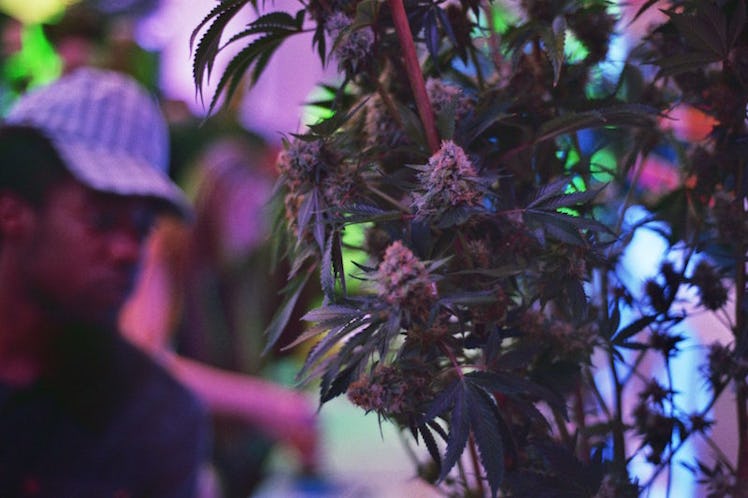
The Real Reason Marijuana Is Illegal In The United States Will Shock You
Blind faith and fear.
These are the only two reasons marijuana is illegal in the United States.
Don't believe me? It's time then for a walk down memory lane with US history.
In the 1930s, the United States was experiencing an influx of Mexican immigrants who brought with them their customs and culture. Part of that culture, as Drug Policy points out, was using “marihuana” for medicinal and relaxation purposes.
At the same time, America was still in the throws of Jim Crow laws, which segregated blacks and whites in nearly every aspect of life.
To assist its efforts in demonizing every race that wasn't white, while also creating an excuse to search and arrest minorities, legislators turned their attention to cannabis as the ultimate propaganda tool.
Harry Anslinger, the first commissioner of the Federal Bureau of Narcotics, said of marijuana at the time,
There are 100,000 total marijuana smokers in the US, and most are Negroes, Hispanics, Filipinos and entertainers. Their Satanic music, jazz and swing result from marijuana use. This marijuana causes white women to seek sexual relations with Negroes, entertainers and any others. Reefer makes darkies think they're as good as white men.
This was enough to send everyone into a tailspin about marijuana, pushing the Marijuana Tax Act forward. It eventually passed in 1937 with support from nearly everyone, except of course, the medical community.
As a Princeton University article points out, the bill was passed over the objections of Dr. William Woodward, legislative counsel for the American Medical Association. Dr. Woodward had argued that the bill was misleading with its use of the world “marijuana” as it was a term largely unused in the medical community, which instead understood the plant as cannabis.
Furthermore, Dr. Woodward doubted all claims that marijuana caused erratic behavior and violence. Dr. Woodward instead suggested marijuana be added to the Harrison Narcotics Tax Act, which would simply regulate and tax the sale, imports and production of marijuana.
Woodward is noted as saying,
Marijuana is not the correct term... Yet the burden of this bill is placed heavily on the doctors and pharmacists of this country.
The Marijuana Tax Act remained in place until 1970, when the Supreme Court declared it unconstitutional. In response, Congress passed the Controlled Substance Act and listed marijuana as a schedule 1 narcotic, classifying it as a drug with zero medical benefits. The drug remains on the list to this day, right next to heroin and cocaine.
But to say marijuana's racially charged history is all a thing of the past would be a lie.
Even with legalization for both recreational and medical purposes creeping ever-so-slightly forward, marijuana remains a polarizing and racial nightmare.
Despite data showing marijuana use to be the same across white people and black people, a 2013 study by the American Civil Liberties Union shows black people in America are nearly four times more likely to be arrested on charges of marijuana possession than white people.
As the ACLU further pointed out,
Of the 8.2 million marijuana arrests between 2001 and 2010, 88 percent were for simply having marijuana.
This means, more than half of all drug arrests in the US are made for marijuana.
And if you thought the national average of arrests for blacks vs. whites was bad, you need to check out the nation's capital.
In DC, Iowa, Minnesota and Illinois, black people were 7.5 to 8.5 times more likely than their white counterparts to be arrested for possessing pot, the ACLU reported.
And it's not much better in states where marijuana is largely socially accepted.
According to an opinion piece written for The Los Angeles Times by Stephen Gutwillig, the California state director of the Drug Policy Alliance,
Blacks make up less than 7 percent of the state population but 22 percent of people arrested for all marijuana offenses and 33 percent of all marijuana felony arrests.
And it's not just the general public who has bought into the idea that there must be some higher reason for marijuana's classification and place in society.
CNN's chief medical correspondent Dr. Sanjay Gupta, admitted a few years ago that he too fell for the propaganda. In a message on his site, Gupta wrote,
I mistakenly believed the Drug Enforcement Agency listed marijuana as a schedule 1 substance because of sound scientific proof. Surely, they must have quality reasoning as to why marijuana is in the category of the most dangerous drugs that have 'no accepted medicinal use and a high potential for abuse.' They didn't have the science to support that claim, and I now know that when it comes to marijuana neither of those things are true. It doesn't have a high potential for abuse, and there are very legitimate medical applications.
The fight for legalization is about more than just a bunch of stoners looking to get baked. It's about helping the scientific community gain access to funds to research the plant's benefits; it's about allowing those who need it for medical purposes to give it a try; it's about helping the country heal over a deep and impactful racial divide.
It's time to “just say no” to ignorance.